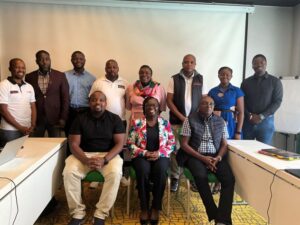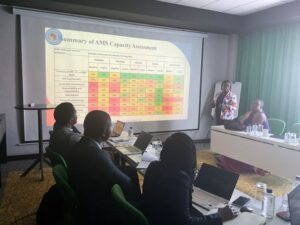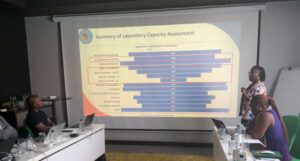MAAP Phase II Launches Ambitious Effort to Tackle Antimicrobial Resistance Across Africa
 The Mapping Antimicrobial Resistance and Antimicrobial Use Partnership (MAAP) team recently convened in Nairobi, Kenya for the initiation meeting of phase II. The two-day workshop focused on enhancing the quality, quantity, analysis, and dissemination of data related to Antimicrobial Resistance (AMR), Antimicrobial Consumption (AMC), and Antimicrobial Use (AMU). The discussions also included a retrospective analysis of lessons learned from Phase I to inform the success of phase II.
The Mapping Antimicrobial Resistance and Antimicrobial Use Partnership (MAAP) team recently convened in Nairobi, Kenya for the initiation meeting of phase II. The two-day workshop focused on enhancing the quality, quantity, analysis, and dissemination of data related to Antimicrobial Resistance (AMR), Antimicrobial Consumption (AMC), and Antimicrobial Use (AMU). The discussions also included a retrospective analysis of lessons learned from Phase I to inform the success of phase II.
Dr Talkmore Maruta, Ag. Director of Programs, highlighted key findings from phase I, emphasising the lack of substantive commitments from countries and investments to address AMR, poor infrastructure, and ineffective data use. To ensure project sustainability, Dr Maruta stressed the need for informed decision-making by policymakers, building in-country capacity for AMR advocacy, and establishing agreed national plans with clear roles and responsibilities for improved data coordination.
Dr Yewande Alimi from Africa Centres for Disease Control (CDC), emphasised the need for a strong coordination within the consortium partners and she reiterated that Africa CDC will continue to provide political leadership for smooth country implementation and policy dialogue throughout the grant period.
 Funded by the Fleming Fund and managed by Mott McDonald, MAAP phase II aims to build on the successes of phase I, focusing on generating high-quality data to inform decision-making in the AMR landscape in Africa. Mr Joshua Mwangi, Chief Operating Officer at ASLM, underscored the importance of a strong project management cycle and highlighted key partnerships with organisations such as the African Union, Africa CDC, WAHO, ESCA, and ASLM.
Funded by the Fleming Fund and managed by Mott McDonald, MAAP phase II aims to build on the successes of phase I, focusing on generating high-quality data to inform decision-making in the AMR landscape in Africa. Mr Joshua Mwangi, Chief Operating Officer at ASLM, underscored the importance of a strong project management cycle and highlighted key partnerships with organisations such as the African Union, Africa CDC, WAHO, ESCA, and ASLM.
Dr Watipaso Kasambara, Project Manager at ASLM, highlighted the workshop’s goals, including gaining insights into consortium partners’ ongoing activities, enhancing operational planning, identifying collaborative opportunities, resolving potential administrative and financial issues, outlining comprehensive consortium activities, and refining detailed operational planning. The collaborative efforts of MAAP phase II aim to make significant strides in addressing AMR challenges in Africa.
In addition, MAAP phase II aims to enhance data production capacity, quality analysis, and data use for policy formulation. Mr Anafi Mataka, Portfolio Lead at ASLM, revealed that while phase I was implemented in 14 countries, phase II will expand to 16 countries, utilising Fleming Fund grants at the country, fellowship, and regional levels. Dr Evelyn Wesangula and Dr Martin Matu, from ESCA-HC, expressed eagerness to collaborate in Phase II, encouraging joint publications and communication to influence country policies on AMR.
The objectives of phase II include scoping and planning through engagement with countries, improved data production and quality, and enhanced data utilisation through the establishment of knowledge hubs.
——————————————————————————————————————————————————————————————————————
The Department of Health and Social Care (DHSC)’s Fleming Fund is a UK aid programme supporting up to 25 countries across Africa and Asia to tackle antimicrobial resistance (AMR), a leading contributor to deaths from infectious diseases worldwide. The Fleming Fund invests in strengthening AMR surveillance systems through a portfolio of country grants, regional grants, and fellowships managed by Mott MacDonald, and global projects managed by DHSC.

